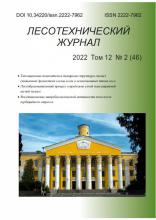UDC 630
Based on 101 sample plots laid in Scots pine forest dendrocenoses aged 72 as an average with fulness around and over 0.7 has the structure in thickness, more exactly – the asymmetry of the distribution of tree numbers according to thickness, been investigated. Based on a retrospective analysis theoretically proved new indices have been introduced for finding and investigating this asymmetry, as well as a new indicator of asymmetry. The results obtained show that: a). The indices of asymmetry and the indicator of asymmetry, which proceeds from the indices, are in a close correlation (R2 = 0.93; 0.94) with the coefficients of asymmetry and are suitable for generalised comparative studies. b). The currently used generalised indicator of asymmetry – the zero natural indicator has a weaker correlation with the coefficient of asymmetry as compared with the correlation between the index of asymmetry and the indicator of asymmetry. c). The comparison between the indices of asymmetry for thickness structure and the indices of steepness for height structure has revealed a common trend as to inversely proportional change in these two kinds of indices and their correlation is R = 0.26. The general conclusion is that the indices and indicators of asymmetry are completely suitable and effective for generalised comparative studies such as, for example, the comparison between the structures in thickness and height of forest dendrocenoses.
forest biometry, diametric distributions, Pinus sylvestris L., skewness, height curves, steepness
1. Dimitrov, E. P. 1978. Regularities of the Thickness Structures of Mature Common Beech Stands. In: Gorskostopanska Naouka (Sylvicultural Science), Book 2, pp. 34-39, in Bulgarian. https://naukazagorata.com/
2. Dimitrov, E. T. 2003. Modelling the Structures, Volumes and Assortments of Middle-Aged and Maturing Dendrocoenoses of Scots Pine, Norway Spruce and Silver Fir. Simolini 94, Sofia, 13-23, in Bulgarian. https://knigolubie.com/index.php?id_product=23863&controller=product
3. Douhovnikov, Y., I. Mihov. 1983. Forest Mensuration. Zemizdat, Sofia, pp. 70-71, in Bulgarian. https://knizhen-pazar.net/sold_products/books/1789980-gorska-taksatsiya
4. Facundo J. Oddi, Cecilia Casas, Matías G. Goldenberg, Juan P. Langlois, Jennifer B. Landesmann, Juan H. Gowda, Thomas Kitzberger, Lucas A. Garibaldi. Modeling potential site productivity for Austrocedrus chilensis trees in northern Patagonia (Argentina). Forest Ecology and Management. 524 (2022) 120525, P. 1-12. https://doi.org/10.1016/j.foreco.2022.120525.
5. Krastanov, K. 1968. Regularities of the Thickness Structures of Mixed Stands of Common Beech and Scots Pine. Gorskostopanska Naouka, Book 5, pp. 25-41, in Bulgarian. https://naukazagorata.com/.
6. Kyle W. Tomlinson, Lourens Poorter, Frans Bongers, Fabian Borghetti, Loes Jacobs, Frank van Langevelde. Relative growth rate variation of evergreen and deciduous savanna tree species is driven by different traits. Annals of Botany, 2014, V. 114, Iss. 2, P. 315-324, https://doi.org/10.1093/aob/mcu107
7. Luiza Tyminska-Czaba´nska, Ewa Grabska 1,2 and Stanisław Orzeł 1 Site Index Models for Main Forest-Forming Tree Species in Poland Jarosław Socha 1, Forests 2020, 11, 301; doihttps://doi.org/10.3390/f11030301
8. Markov, I. 2007. Naturalnite pokazateli na prof. Dukhovnikov, Nauka za gorata, kn. 4, in Bulgarian. https://naukazagorata.com/?s=2007
9. Mihov, I. 1984. Indices for Determining the Types of Growth of Forest Growing Stocks. Gorsko Stopanstvo (Forestry) Magazine, Book. 4, pp. 49-52, in Bulgarian. https://www.gorabg-magazine.info/
10. Mihov, I. 1986. Method of Determining the Types of Growth of Growing Stock and Its Application in Differentiated Site-Indexing of Natural Scots Pine Stands. Dissertation, pp. 49-52, in Bulgarian. https://fri.bas.bg/wpcontent/uploads/15.%D0%A0%D1%83%D0%BC%D0%B5%D0%BD-%...
11. Mihov, I. 2005. Forest Mensuration. Sofia, pp. 101-111, in Bulgarian. https://knizhen-pazar.net/sold_products/books/777691-gorska-taksatsiya
12. Mihov, I., R. Petrin. 1996. Indices for Determining the Types of Growth of Natural, Common-Beech Stands. Proceedings of The Second Balkan Conference on Investigation, Preservation and Utilisation of Forest Resources (3-5 June 1996, Sofia) Vol. I. pp. 50-53, in Bulgarian. https://fri.bas.bg/wpcontent/uploads/15.%D0%A0%D1%83%D0%BC%D0%B5%D0%BD-%...
13. Mihov, I., Y. Poryazov, M. Manev. 1996. Studies of the Regularities of the Structure of Mature Common Beech Stands in the Petrohan Teaching-and-Training Forest Enterprise. NTLTI, Vol. XXXVII, pp. 96-101, in Bulgarian. https://ilib.ltu.bg/en/bool-simp.php?bool=(16=%CC%E8%F5%EE%E2,%20%C8.$)&page=1
14. Nedyalkov, S. 1955. Thickness Structures of High-Forest Common-Beech Stands in Bulgaria. Gorsko Stopanstvo (Forestry) Magazine, Book7, pp. 305-318, in Bulgarian. https://www.gorabg-magazine.info/
15. Nedyalkov, S. 1959. On the Structures of Hungarian-Oak Coppice Stands in Bulgaria. Proceedings of the Forest Research Institute, Vol.5, pp. 89-147, in Bulgarian.
16. Petrin, R. 1988. Regularities of the Growth of Common-Beech Stands and Their Application in Forest-Management Planning. Dissertation, pp. 41-90, in Bulgarian. https://fri.bas.bg/wp-content/uploads/15.-%D0%A0%D1%83%D0%BC%D0%B5%D0%BD...
17. Petrin, R. 2014. Investigations of the Thickness Structures of Scots-Pine Dendrocoenoses. 145 Years since the Establishment of the Bulgarian Academy of Sciences Digest. Research Published Works of the Forest Research Institute, pp. 81-89, in Bulgarian.
18. Petrin, R. 2015. Height structure of Scots pine stands. Forestry ideas, vol. 21, No 2 (50), p. 241-249.
19. Petrin, R. 2016. Thickness Structure of Frainetto Oak, Sessile Oak and Cerris Oak Dendrocoenoses. Management & Sustainable Development, Year 18, Vol. 57, pp. 91-95. https://jmsd.bg/issues_bg.html
20. Petrin, R. 2019. Thickness Structures of Seed-Tree Frainetto Oak, Sessile oak and Cerris Oak Dendrocoenoses. Scientific Works of the Union of Scientists in Bulgaria - Plovdiv. Series C. Technics and Technologies. Vol. XVII., ISSN 1311-9419, pp. 224-234.
21. Petrin, R. 2020. General Regularities of Height-Diameter Curves in Frainetto Oak, Sessile oak and Cerris Oak High Forests. Silva Balkanica 21(2), pp. 71-82.
22. Petrin, R. 2021. An Index Method and Its Application in Studying Forest Stands Structure and Growth. Scientific Works of the Union of Scientists in Bulgaria-Plovdiv, Series B. Natural Sciences and the Humanities, Vol. XXI, pp. 113-125.
23. Petrin, R. and I. Markoff. 2015. Thickness Structures of Norway-Spruce and Silver-Fir Dendrocoenoses. Management a nd Sustainable Development Magazine, Year 17, Vol. 55, pp. 97-102, in Bulgarian. https://jmsd.bg/issues_bg.html
24. Petrin, R. I. Mihov. 2014. Investigations of the Thickness Structures of Natural Mature and Middle-Aged Common-Beech Dendrocoenoses, 145 Years since the Establishment of the Bulgarian Academy of Sciences Digest. Published Research of the Forest Research Institute, p. 25, in Bulgarian.
25. Petrin, R., I. Markoff, I. Mihov. 2013. Thickness and Height Structures of Natural Seed-Tree Common-Beech Dendrocoenoses in Bulgaria. Management and Sustainable Development Magazine, Year 15, Vol. 43, pp. 82-87, in Bulgarian. https://jmsd.bg/issues_bg.html
26. Petrin, R., I. Markoff, I. Mihov. 2014. Comparative Investigations of the Height Structures of Natural Mature and Middle-Aged Common-Beech Dendrocoenoses. Management and Sustainable Development Magazine, Year 16, Vol. 49, pp. 76-81, in Bulgarian. https://jmsd.bg/issues_bg.html
27. Petrin, R., I. Markoff. 2016. Height Structure of Oak Coppices (Frainetto, Sessile and Cerris oak). Forestry Ideas, Vol. 22, No. 2 (53), pp. 206-213. https://forestry-ideas.info/issues/issues_Index.php?pageNum_rsIssue=1&to...
28. Petrin, R., K. Bogdanov. 2017. Comparative Investigations of the Form Factor for Different Tree Species. Uniform Average Form Factor. Management & Sustainable Development, 2, Year 19, Vol. 63, pp. 55-60. https://jmsd.bg/issues_bg.html
29. Petrin, R., I. Markoff. 2018. Thickness Structures of Natural and Artificial Scots Pine Dendrocoenoses. Scientific Researches of the Union of Scientists in Bulgaria-Plovdiv, Series B. Natural Sciences and the Humanities, Vol. HVIII, ISSN 1311-9192, pp. 51-58. https://usb-plovdiv.org/wp-content/uploads/2019/05/2018_estestveni_i_hum...
30. Petrin, R. 2021. Comparative analysis of the thickness and height structure of forest oak dendrocenoses using new indicators in the study of asymmetry. Scientific works of the Union of Scientists in Bulgaria-Plovdiv, series B. Natural and humanitarian sciences, item XXI, pp. 126-136. https://usb-plovdiv.org/scientific-works-en/
31. Prodan, M, 1961, Forstliche Biometrie, BLV Verlaggesellschaft, München-Bonn-Wien, 432 pp. https://www.google.com/search?q=Prodan
32. Prodan, M, 1965. Holzmesslehre. J.D. Sauerländersverlag, Frankfurt am Main, 644 pp. https://www.google.com/search?q=Prodan
33. Seo Yeongwan, Daesung Lee & Jungkee Choi. Growth pattern analysis of major coniferous tree species in South Korea, Forest Science and Technology 2017:14(1):1-6 https://www.researchgate.net/publication/321839385
34. Stankova, T., T. Zlatanov. 2010. Modeling diameter distribution of Austrian black pine (Pinus nigra Arn.) plantations: a comparison of the Weibull frequency distribution function and percentile-based projection methods. Eur J Forest Res (2010) 129:1169-1179 https://www.researchgate.net/publication/226406340
35. Stankova, T., U. Diéguez-Aranda. 2010. Diameter distribution model for Scots pine plantations in Bulgaria. Forestry ideas, 2010, vol. 16, No 2 (40). 155-162. https://www.researchgate.net/publication/233777100
36. Tomlinson, Kyle W., Lourens Poorter, Frans Bongers, Fabian Borghetti, Loes Jacobs, Frank van Langevelde. Relative growth rate variation of evergreen and deciduous savanna tree species is driven by different traits. Annals of Botany, 2014, V. 114, Iss. 2, P. 315-324, https://doi.org/10.1093/aob/mcu107.
37. Tretyakov, N. V. 1927. Forest-stands structure uniformity law (Zakon edinstva v stroenii nasazhdeniy). Novaya Derevnya, Moscow-Leningrad, pp. 26-34, in Russian.
38. Trouillier Mario, Marieke van der Maaten-Theunissen, Tobias Scharnweber, Martin Wilmking. A Unifying Concept for Growth Trends of Trees and Forests -The "Potential Natural Forest“. J. Frontiers in Forests and Global Change, Sep 2020, ISBN: 2624-893X. p. 2-12. https://doi.org/10.3389/ffgc.2020.581334
39. Tyurin, A. V. 1938. Forest Mensuration (Taksaciya lesa). Goslestehizdat (State-Owned Publishing House for I Sylvicultural and Technical Literature, Moscow, p. 376, in Russian. https://violity.com/en/102382640-1945-taksaciya-lesa-tyurin-a-v












